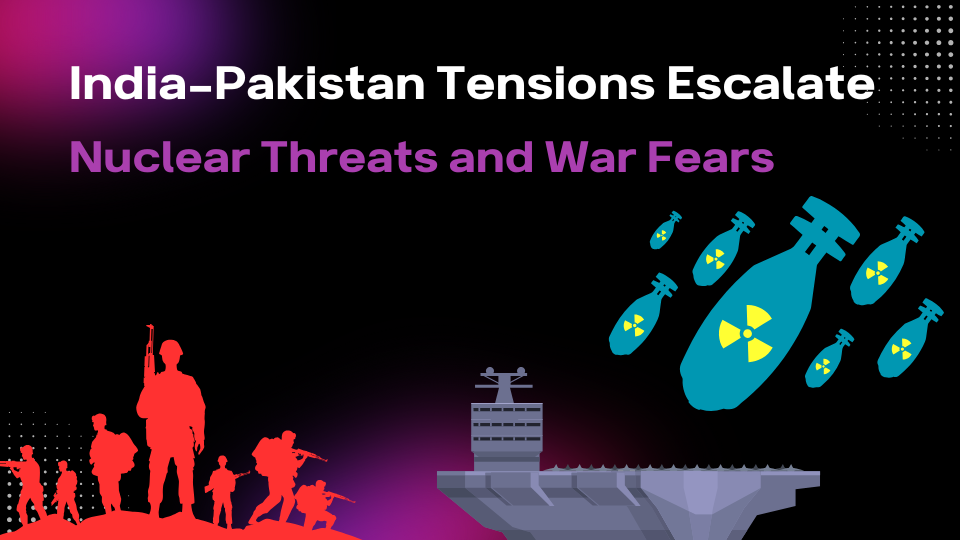India-Pakistan tensions have reached a boiling point once again, with Pakistani leaders issuing nuclear threats while the Indian military conducts drills near the border. Recent developments, including the release of extra water into the Jhelum River and Pakistan handing over its railway system to the military, have heightened fears of an impending conflict.
Key points

Pakistan’s Nuclear Threats
A senior Pakistani minister recently claimed that 130 nuclear warheads are aimed at India and warned that any disruption to Pakistan’s water supply could lead to war. He stated that missiles like Ghaznavi, Shaheen, and Ghauri are not for show but are actively deployed against India.
“The 130 nuclear weapons we possess are not just for display. They are deployed against India, and the world knows it,” – Pakistani Minister
Pakistan’s Military Preparations
Pakistan’s Railway Minister, Hanif Abbasi, confirmed that railway stations and networks have been handed over to the military to facilitate the rapid movement of tanks, heavy artillery, and troops. This is seen as Pakistan’s largest military mobilization since 2019.
Some reports suggest that Pakistan is positioning artillery and tanks along the border, indicating preparations for a potential Indian strike.
India’s Diplomatic Moves
India has been engaging with over 100 countries, presenting evidence of Pakistan’s alleged involvement in terrorist activities. Foreign Minister S. Jaishankar and Prime Minister Narendra Modi have been in talks with global leaders, emphasizing that “terrorism must be met with a strong response.”
Additionally, India has suspended the Indus Water Treaty, a move that could worsen Pakistan’s water crisis. This decision is being viewed as India’s strongest diplomatic strike since the wars of 1965, 1971, and 1999.
International Response: Pakistan Isolated
Pakistan recently sought help from Russia and China, but neither country has offered clear support. Instead, Russia may soon accuse Pakistan of having links to the Moscow Crocus City Hall attack (which killed 150 people). If confirmed, Pakistan could face global condemnation for terrorism.
Will there be war on increasing India-Pakistan Tensions
Analysts suggest that India may launch missile strikes on terrorist camps inside Pakistan or impose a naval blockade in the Arabian Sea. However, full-scale war is likely only if Pakistan carries out a preemptive strike, similar to its actions in 1971.
There are also reports that Pakistan’s Army Chief, Asim Munir, has sent his family to the UK, indicating that top generals fear an escalation.
Nuclear War a Possibility?
Pakistan has 170 nuclear warheads, with 130 reportedly aimed at India. India, in turn, possesses 172 nuclear weapons. If war breaks out, global powers like the US, Russia, and China may intervene to prevent a nuclear catastrophe.
Can India win war against Pakistan?
India’s military is significantly larger and better funded than Pakistan’s. It boasts superior ground forces, a more advanced air force with modern fighters like the Rafale and Su-30MKI, and a powerful navy featuring aircraft carriers and nuclear submarines. In terms of armored vehicles, India outnumbers Pakistan by roughly three to one, and its missile arsenal includes long-range Agni series missiles capable of striking deep into Pakistani territory. These factors give India a substantial edge in a conventional conflict.

India is more stronger than Pakistan because India contains more weapons and bigger military than Pakistan. Both countries are nuclear capable and a nuclear bomb don’t see who is strong. If nuclear bomb will be fired from both side then both countries will be in huge loss.
India holds clear advantages in terms of military size, technology, and economic resources, the realities of modern warfare-especially between two nuclear-armed neighbors-make the outcome of any conflict highly unpredictable.
You should also check:- Pahalgam Terror attack